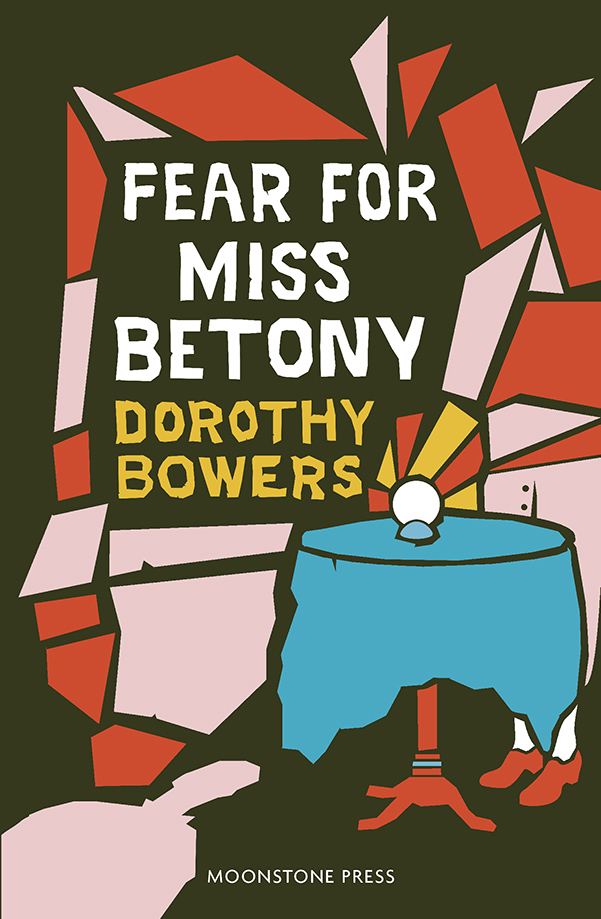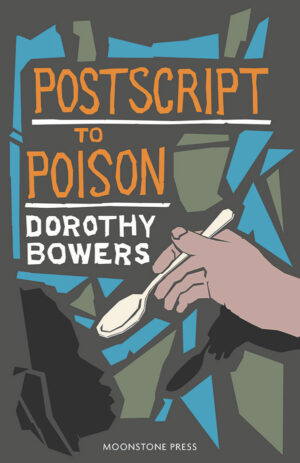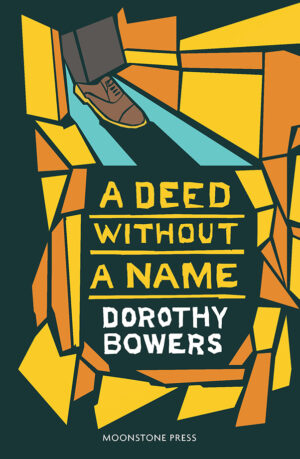Fear For Miss Betony
Former governess Emma Betony is living in quiet and boring retirement when two unexpected letters arrive. The first is a lonely hearts magazine, with an entry
(“Lonely Batchelor, age 49, good health, comfortable income, seeks friendship of unattached lady with view to matrimony”) highlighted by the anonymous sender. The second is an appeal for help from a former student. Grace Aram is running Makeways, a struggling boarding school for girls, newly relocated to a site of former nursing home in Dorset. Grace isn’t interested in Miss Betony’s teaching skills—she wants a trusted friend to help identify the culprit behind a series of troubling events. Two nursing patients have remained at Makeways and one appears to be the victim of a poisoner. It is not clear who could be responsible for the ongoing trickle of arsenic found in Miss Thurloe’s drinks- the new abrasive doctor, the pragmatic nurse, the nervous teaching staff or the high-strung students. During her investigations, Miss Betony uncovers an overwhelming sense of fear on the part of Makeways’ inhabitants, and clues that lead to the Great Ambrosio, a charismatic fortune-teller, who seems to have an undue influence on various teachers, students – and Miss Thurloe.
First published in 1941, Fear and Miss Betony marks the final appearance of Chief Inspector Dan Pardoe—but it is Miss Betony herself who fights through fear and solves the case. Contemporary critics proclaimed the book an instant classic, with an ingenious plot.
£9.99
By Dorothy Bowers
Originally published in 1941 by Hodder & Stoughton
Paperback
256pp
ISBN 978-1-899000-098
Ebook available from Amazon
Interesting links: A review of Fear for Miss Betony by Pretty Sinister Books
Table of Contents
Introduction
I The Likes of Us
II Unattached Ladies
III Interval for Tea
IV Prepare for Poison
V Telling About –
VII The House of Women
VII Rather Unprofessional
VIII The Witching Hour
IX A Question of Bottle
X The Great Ambrosio
XI A Wind is Raised
XII Death is Quiet
XIII A Face in The Glass
XIV The Cortege will Leave…
XV Running Water
XVI Pact-and-Picture
XVII Ambrosio is Right
2 reviews for Fear For Miss Betony
Only logged in customers who have purchased this product may leave a review.
At the age of sixty-one Emma Betony in a kindly light looked ten years younger. She was tall, and still slim, with a figure the Edwardians, among whom she must be counted, called willowy. It was a good simile, because from the waist up there was always that faint inclination that suggested being driven in an open landau and acknowledging an acquaintance across the road. Only in the absence of the landau it somehow had a deprecatory air. Indeed, everything about Miss Betony, the tired soft skin of the permanently pink-veined cheeks, the mild blue eyes, the timorous smile bestowed too frequently perhaps, proclaimed a gentility so inoffensive as to be uninteresting; for to seem innocuous in old age is to invite disregard.
This afternoon, on coming out of the Toplady Homes after her weekly visit to Miss White, she took the path across the quadrangle instead of returning by the archway into Plane Street and, fumbling a moment at the iron gate (locked at 8 in winter, 10 in summer), let herself into the recreation ground in front. On its fringe were seats placed comfortably at haphazard, screened by accommodating shrubs. She sat down on one of them, her hands trembling.
Her own sensitivity to attack from such a quarter shook her now as badly as Mildred White’s remark had done five minutes ago. Was she really so touchy that the absurdity and–yes, the senility of it failed to strike her? No, she wasn’t. That at least was something to be thankful for. Blind resentment only implied in herself the existence of those very traits she condemned in Milly.
“You mustn’t be disappointed if they consider your case unfavourably, Emma. The Homes were intended for gentlewomen, you know, and your dear father was in trade, after all.”
Acidity might have sharpened the words to a point of individual malice that would have made them at once easier to accept and to forget. There could hardly be a communicant at St. Philip’s unaware of the blow Miss White had sustained when the vicar gave into Emma Betony’s charge the decoration of the great south window at Harvest Thanksgiving. True, it was nearly a year ago now; but an affront of that nature was not so lightly passed over There had been, however, no touch of rancour in the reminder that Toplady (George Henry Bumperdown, 1818-79, when the distinction was acutely recognised) had indubitably separated the sheep from the goats in his design for eight almshouses in the borough of Churchway. On the contrary, it had struck a note whose sheer impersonality had shaken Emma Betony with much the same result as one got from agitating a tranquil glass paperweight so as to produce a miniature blizzard. While the storm was still raging she had glimpsed the pitfall into which her feet had narrowly escaped slipping.
For the net spread out for her took in more than the discreet boundary of the Toplady Homes. It embraced, as she saw now, all Churchway, and beyond Churchway a world of thought and living she need not make her own unless she would. If the committee which sat to consider her application looked upon her as a fitting neighbour for Miss White and the other six occupants with their professional and nonoccupational backgrounds, she would then be at liberty to take her place where Betony’s greengrocery would be at once forgiven and unforgotten. So, she would dedicate herself to the service of their loyalties.
But these were the people who frightened her, so little were they moved by personal issues, so profoundly by those affecting their class. It was perhaps rather sweeping to describe them as being emotional only in the sociological sense, but that did more or less illustrate their desiccated quality. It took red blood, after all, to hate another woman for being prettier than yourself, but a much more anaemic fluid to feel the odium of rubbing shoulders with one whose entry and exit at her own home had been a shop door flanked by peanuts, potatoes and beetroot. Gentlewomen? Of course. But Mildred had omitted the qualifying term in the endowment. There they were known as “decayed.” The hint of corruption conveyed in this charming ambiguity suggested an imaginative power of which Mr. Toplady himself must be held guiltless.
Emma smiled as she poked gently with her umbrella at the moist path. When in anger concentrate thought and vision on something wholly detached from yourself. She had taught it her pupils over a long range of years and had found that, unlike the majority of precepts, it worked well in practice. Now, as she watched the thin spirals of vapour the afternoon sun was drawing from the gravel the importance of Mildred White and her kind seemed of equal evanescence. They belonged to the most vulnerable order on earth, the little people with small incomes, smaller brains, and smallest talents, who led the circumscribed lives that made them the Aunt Sallies for every Smart Aleck. Castigating them was an old and not very laudable practice. It went on, mainly, she thought, because of their surprising continuity. As a class these pious spinsters and unadventurous widows and widowers and little professional folk who had no big names with which to disarm criticism were uncommonly good at survival. The herd instinct again, she supposed.
Well, I won’t subscribe to it, Emma thought, flushing a little at such mental resolve. I won’t, even if I have got the forty pounds a year which makes me acceptable to Toplady. (If it were thirty-nine, now, it wouldn’t have been any use applying for the vacancy at all. Think of that.) But I’ve got too my independence, which is another way of saying myself. It may have to go, but not among the Topladies. Father struggled hard to give me a good education—he was never properly alive to the inferiority of women—and it was a good one in the days when I had it. I’ve knocked about a bit, and seen and heard and known a few things that would make poor Milly goggle, though I am silly and antiquated now, and credulous in some ways still. But the one side of me, the one that got the edges knocked off, will always pop in to the rescue of the other. It always has and it always will. Because in the end I don’t accept other people’s shibboleths. My own may be even stupider, but they are my own. And one of them is that people can’t finally be docketed and pigeonholed according to what their fathers sold or didn’t sell. You can do it for a time, but ultimately it doesn’t work. There’s only goodness and wickedness—and it’s no good sorting those too precisely, because they get mixed in the most confusing way however careful you are. So I won’t have a Toplady. And that means asking for parish relief. Dear me, I shan’t like it very much… But the parish won’t either.
With which consolatory afterthought Miss Betony rose and went home to Mrs. Flagg’s boarding establishment in Museum Road.
She had lived there four years, in the tall, self-effacing house in a back street where the pavements marched sheer with the front doors and coffee-coloured net screened from the infrequent passerby the occupations of the ground floors. Her sojourn there had been marked by a significant ascent. Beginning at the first floor with windows commanding the complacent features of the Toplady Museum over the way, she had moved eighteen months later to a small but pleasanter room up the next flight, whence she looked down on five strips of walled garden, a budgerigar house, and the backs of homes that early each week flaunted their laundry like festive bunting.
Climbing had indeed its compensations, for the next move which nine months ago had brought her to the attic floor, with two buckets of sand in grim attendance at the top of uncarpeted stairs and the homely world of Monday washing and apple trees and cage birds dropping away beneath her, had given her too what none of the other boarders shared, a view of sky and distant hills, and bright gleams of the river slipping smoothly away to the sea that lay somewhere behind them. Sometimes she fancied she could taste its breath on her lips. It was a salutary reminder that life had not been spent wholly in Churchway.
It was nearly teatime when she got in. The hall was dim and a little odorous still. Noon, with its attendant aroma, lingered overlong at Mrs. Flagg’s. Emma glanced left at the table where the afternoon post might be found. There was nothing there, but as she went by to the stairs a door on the right opened and Mrs. Flagg, in a whispering brown dress, came out of her private sitting room. In the quick gush of light from her own window her rigid black hair looked more than ever like a wig. It seemed to Emma for one flickering second that she had moved towards the hall table. The next she was coming up to her with something in her hand.





Editor –
Review from Kirkus, January 23, 1942
“In a subdued manner, an impressively clever job, with a perfect integration of crime, backgrounds, and characterization which gets its psychological due. The London Times heralds it as “the best detective story of the year” – some American readers may find it a little British for general taste here though connoisseurs will cherish it. How Emma Betony, a gentle, stubborn retired governess accepts a post as teacher from a former charge, in an old house which is part nursing home, part school. When attempts on the lives of one of the inmates and the pervading hypnotist and murder combine to force an issue, Miss Betony gather the data for Scotland Yard’s solution. Good going.”
Editor –
Review from The Times Literary Supplement, November 1, 1941
Elderly ugly spinsters of humble birth are coming into their own. What endearing heroines they make has been proved before by detective stories and now Miss Dorothy Bowers wins our glowing admiration for one who is saved from becoming a decayed gentlewoman in an almshouse solely because her father was a greengrocer. “Fear for Miss Betony” is the best detective story of the year so far. The crime is cleverly committed and cleverly detected but that is not all. Besides providing all that is usually asked of this this kind of fiction, the author makes her characters as interesting for their own sake as novelists untrammelled by the shackles of mystery would. The house, part school, part nursing home, where the fear lurks is haunted by ghosts who are sound psychologically. Every page bears witness to a brain of uncommon powers.